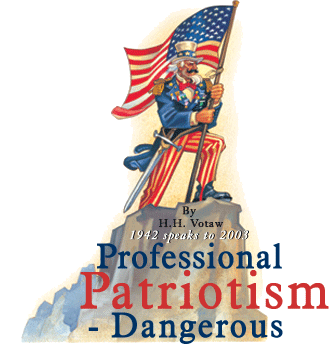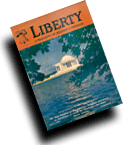Professional Patriotism
H. H. Votaw March/April 2003
Getting your Trinity Audio player ready...

Illustration by David Lafleur

In every mob there are those craven folk who would never dare alone to attack a victim. They are the ones who make the loudest noise, who talk the most about their bravery. Courage—real courage—is apt to be calm. The one who shouts and gesticulates most stands in danger of dissipating his energy. Whistling in the dark or when passing a graveyard is a small boy's way of showing that fear is not in his heart at all, of advertising his courage.
In wartime there are those who talk much of loyalty, who, when somebody is watching, wave the flag, who are quickest to speak out against anyone who might disagree with them on any point. These brave (?) folk must cover up cowardice by attacking others.
Many at this time are demanding that conscientious and devout folk give up their religious convictions because of the nation's danger. Every good Christian is a good citizen. No man can be a good Christian and not be a good citizen. Every good citizen will naturally want to give the best he can to the best land on earth. But no good state can or will ask any of its citizens to sacrifice that which is more precious than life.

These observations are prompted by an incident that came to our attention recently. A young Seventh-day Adventist woman employed in one of the departments of the government in Washington was commanded to appear for work on Saturday. She offered to come earlier and work later each day in the week to make up for time lost by Saturday absence. She even offered to work on Sunday, if there were any place where her services could be used, and not accept the extra allowance that is generally made for Sunday work. She advanced one or two other suggestions for giving the government the full measure of her services, but all she got for her pains was to be told that she was yellow—a fifth columnist. The man who thus spoke to her may have lived in America all his life; he may have sprung from an ancestry that goes back to Plymouth Rock, for all we know. But it is perfectly certain that he knows nothing about the spirit that prompted the men who founded this nation.
It will be a sad day indeed for America if the time ever comes when any service to the state is placed above the duty that man owes to his God, and if an attempt is made to force the conscience of the citizen. The founder of the Christian faith bade His followers to "render . . . unto Caesar the things which are Caesar's; and unto God the things that are God's."
In the present conflict for the preservation of the things that have been precious to us during all our history, some urge that it is necessary to sacrifice inherent rights for a time, that they may be secured for the future. We recognize that the struggle now going on is a vital one for America, but we agree with the words of Senator [Joseph] Guffey contained in an address entitled "Civil Liberties in a Nation at War" and printed in the Congressional Record of December 15, 1941.
"Traditionally the American people have recognized a distinction between the liberties they enjoy in time of peace and the restrictions they must necessarily expect in time of war.
"This does not mean that the Bill of Rights is to be suspended for the duration of the emergency. Nor does it mean, as some are inclined to assert, that our liberties are only 'qualified' in any event. They are as real today as they have ever been in our history. It is important that we keep them that way. Should we deny their essential validity now, we would deny the very democracy we are fighting to preserve, for they are in a real sense the foundation of our democracy. . . .
"To those who incline to the belief that the Bill of Rights should be suspended in wartime, I say that we should all remember that without the Bill of Rights we should not have had a Constitution at all. Our forebears made it a condition precedent to ratification of the Constitution as it was originally proposed. In fact, the history of my own state of Pennsylvania records that Abraham Lincoln's grandfather, as one of Pennsylvania's representatives, refused to vote
for ratification of the Constitution as first submitted
because the Bill of Rights was not included. . . .
"Because our government is of the people, by the people, and for the people—because it is carrying out the people's mandate and directing the people's endeavors as the people wish them directed—we need have no fear that our war effort will be impeded by strict adherence to the principles of the Bill of Rights. In fact, I conceive the real danger to our Bill of Rights in wartime to be not legislative enactments, but rather the misdirected patriotism of individuals and groups who may be inclined to brook no criticism of our endeavors. . . .
"I am completely satisfied that we can take all necessary measures to combat subversive activity without violence to the Bill of Rights. In fact, the Department of Justice has already had occasion to warn local executives throughout the nation that molestation of foreign nationals is to be avoided. This step was necessary, lest, in an excess of zeal, our local authorities should trample upon the rights of innocent individuals. . . .
"The liberties explicit in the Bill of Rights are the liberties our forefathers won with their lives. We have defended them on many a battlefield. We are defending them now. Because they grant to our people freedom from oppression, they set us apart from other nations in which the liberties of the people have been at the varying mercies of their sovereigns. They released and gave means of expression to the initiative which enabled our pioneers to conquer the wilderness. They have formed the basis of a great peaceful inland empire in which all men are equal before the law. They are worth defending. They have made us great in times of peace; they shall make us invincible in this dark hour of war. Because we are free we do not know the meaning of fear, nor is there in our minds and hearts any doubt of the outcome.
"I say that now, in the midst of war, is the time for us to proclaim our Bill of Rights as the great charter of freedom which we are fighting to preserve. Let it stand forth as a shining light to those nations engulfed in darkness, as a beacon in the storm, so that all who labor beneath the yoke of dictatorship may look up and take heart. Let us look upon our flag as a symbol of the liberties guaranteed by our Bill of Rights, so that the peoples of the world may say, wherever it waves, There men are free. Then let us address ourselves to our historic task, upon which the fate of all free men depends, the task of keeping that flag flying."
We commend these words to all thinking people. We believe that Americans will do well to face whatever the future holds with the firm determination not to infringe upon the rights of conscience of any man or woman. Let us be sure to cherish these rights in war as in time of peace.
This article appeared in the Second Quarter 1942 issue of Liberty. H. H. Votaw was an associate editor. He and Senator Guffey could not have more accurately presented the situation we face today in our war.